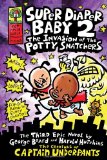My 7 year old son is reading aloud! I should be so proud. Yet, he is reading the prose of Super Baby Diaper 2, another semi-literate installment in the Captain Underpants series.
I cringe at every sentence beginning with “Me want…,” and yet I’m glad he’s reading something other than those other puerile Scholastics “classics,” the retelling of Star Wars by Lego characters.
At the same time I’m hearing him read aloud, I am reading an opinion piece in the Saturday Wall Street Journal Review (my favorite section of the week) on the power of memorization of poetry and prose (“How Memorization Makes Words Live“). Memorization has become an ante-diluvian concept in our internet-ready world, looked on as backward as bothering to learn the multiplication tables. Yet, I believe, as the author does, that poetry is learned in a different way when you carry it around with you, ready to jump out at the strangest times and with the most abstruse connections. Popular music does this the same, at least when it’s written well. The lyrics of Cole Porter, George Gershwin and Joni Mitchell are for me as close as the words of Frost, Yates, Eliot, and Prévert. Kids can find their analogues in modern music (God knows where) to understand the power of holding words inside themselves.
And this is where I connect reading to money. In posts long ago, I’ve pondered the use of allowances. As the wise Harvey Beck, of ActiveAllowance.com, once told me, the way parents give allowances is often a reflection of their political and economic beliefs. Some parents give an allowance for doing jobs around the house, connecting cash with work. Others communicate that the family is like a commune; every person does their jobs and an allowance is part of the bargain, but isn’t paid for getting the work done. Still others may just pay for specific tasks. We give our kids an allowance responsibilty-free,which I suppose reflects the effect of living in San Francisco for fifteen years. The kids get money for some tasks, especially those associated with work experience and things I’d rather not do myself, like stuffing envelopes. But the real money-maker for them is in reading and poetry. $2 for every “real” book they finish and $2 for every poem over 20 lines. Motivated kids could make a mint that way. Instead my son is happily reading “Super Diaper Baby 2, The Invasion of the Potty Snatchers.” Go figure. He’s done the price/value correlation and has decided that entertainment trumps industry, at least before noon on a Saturday.


Leave a Reply
You must be logged in to post a comment.